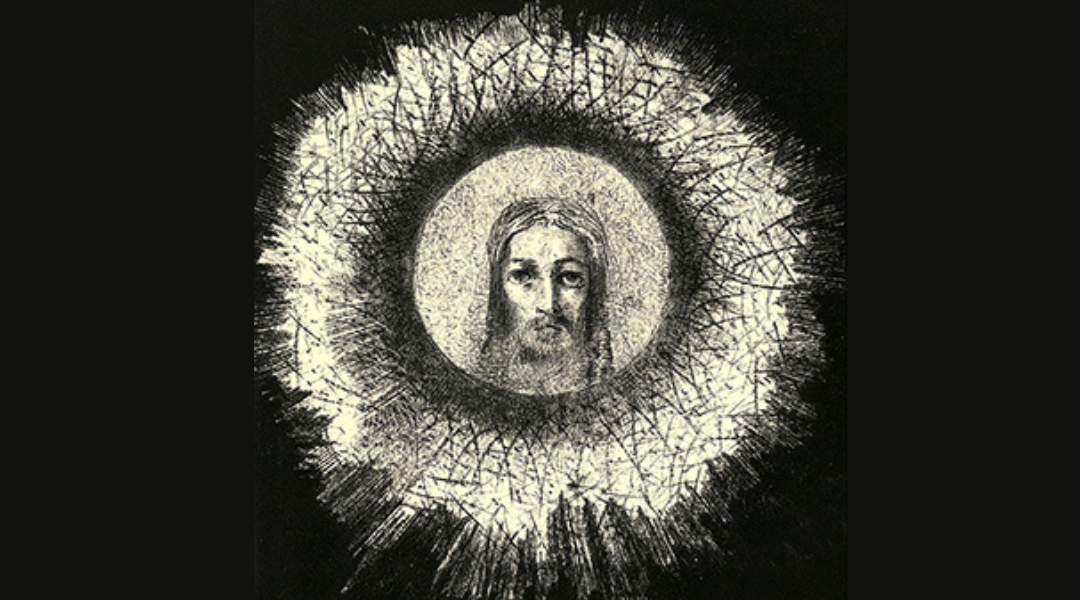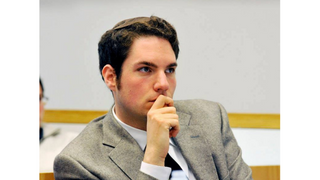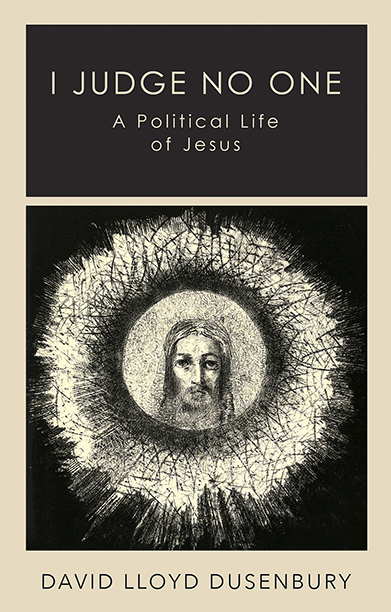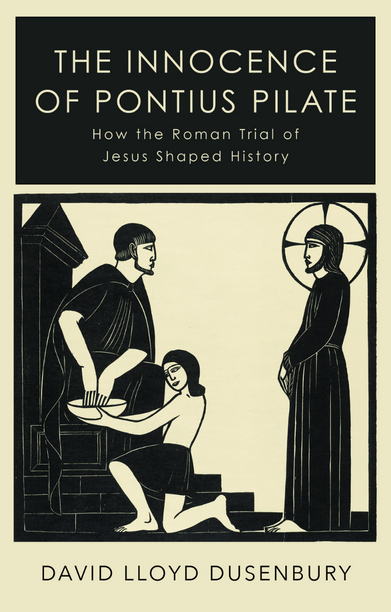
Prof. David Lloyd Dusenbury
UCSIA/IJS-Chair for Jewish-Christian Relations 2022-23
The UCSIA/IJS-Chair for Jewish-Christian Relations will be held by Prof. David Lloyd Dusenbury in the academic year 2022-23.
David Lloyd Dusenbury is a philosopher and historian of ideas. His most recent book is I Judge No One: A Political Life of Jesus, published by Hurst and by Oxford University Press. He obtained his doctorate in philosophy from KU Leuven and subsequently held a research fellowship at the Hebrew University of Jerusalem. He is currently a senior visiting fellow at Budapest’s Danube Institute and visiting professor at Eötvös Loránd University. He has lectured widely in Europe, and he writes for The Times Literary Supplement, La Lettura, and others.
He will talk about:
- The Strangeness of Jesus: Benedict de Spinoza and the Gospels
in the public lecture on 20 February 2023 - The Politics of Jesus’ Death: Jewish-Christian Notes on the Gospels’ Passion Narratives
in the seminar on 24 February 2023

The Strangeness of Jesus: Benedict de Spinoza and the Gospels
public lecture by Prof. David Lloyd Dusenbury on 20 February 2023
Friedrich Nietzsche once called Jesus a “strange figure” (fremde Gestalt). In this lecture, we will reflect on one aspect of this strangeness: Jesus cannot be understood without reference to the rabbinic culture of his day – he is frequently called rabbi in the four canonical gospels – and yet, he is remembered in the gospels (and in certain other first- and second-century texts) as a critic of first-century rabbinic culture. Which is it? (1) Is the Jesus of history a “great rabbi” (rabboni)? Already in the seventeenth century, one learned Venetian rabbi, Leon Modena, assimilated Jesus to first-century Pharisaic culture; and this tendency has reasserted itself in recent decades.1 Or (2) is Jesus a sort of “heretic”? In more than one circle, this is the conventional view. Dusenbury will suggest that one of Modena’s younger contemporaries, Spinoza, can help us to make sense of Jesus’ strangeness in the gospels. For, according to Spinoza, Jesus is not only a rabbi but a prophetic figure. As such, Jesus is – like the prophets – both a bearer and a critic of Israel’s religious culture. And as such, he is – like Spinoza and other philosophers – a “strange figure”.
Response by Dennis Baert, an affiliated researcher and lecturer at the Institute of Jewish Studies of the University of Antwerp. His research expertise is on political theology in modern and contemporary Jewish philosophy, especially within the context of interwar Central-Europe. He focuses on the thought of Franz Rosenzweig and his place within a broader current of Jewish post-imperial political theory. Most recently he published a chapter on Rosenzweigian epistemology and politics in The Marrano Way (De Gruyter). He has Master’s degrees in both Law and Philosophy and studied at KU Leuven, the Humboldt Universität zu Berlin and St. Edmunds College, University of Cambridge.

Date & Time
Monday 20 February 2023
8.00 – 9.30 p.m.
Followed by a reception.
Location
F. de Tassiszaal
Prinsstraat 13, 2000 Antwerpen
Registrations
Free entrance.
Please register online before 16 February 2023.
The Politics of Jesus’ Death: Jewish-Christian Notes on the Gospels’ Passion Narratives
seminar on 24 February 2023
In this seminar, David Dusenbury will take participants through a series of textual elements and hermeneutical reflections – many, but not all of which, feature in his new book I Judge No One. A Political Life of Jesus. They confirm, for Dusenbury – though not for many Jewish and Christian commentators – that the canonical Passion narratives are not, in themselves and originally, Judaeophobic, though they manifestly became that in certain church-traditions of the second century CE (and after).
Questions we will ask: What are we to make of the “killing-of-the-prophets” as a motif in the gospels? Of Judas’ betrayal-money, and Pilate’s hand-washing? Which member of the Jerusalem Sanhedrin is said, in one of the gospels, to have voted against the conviction of Jesus? Of what crimes was Jesus nevertheless convicted? By whom was he questioned, tried, and ultimately crucified (according to the canonical gospels)? And how credible is the drama of his death, in the gospel-collection, in broad outline?
Not only Dusenbury’s Jesus book, but its predecessor – on the Roman trial of Jesus – was written with the spectre of Christian anti-Semitism very much in mind. In this seminar, David Dusenbury will share some of his findings, try to justify his conclusions – and, of course, welcome questions and objections.
Date & Time
Friday 24 February 2023
1.00 – 4.00 p.m.
Location
City Campus – Room S.R.231
Rodestraat 14, 2000 Antwerp
Registrations
Free entrance
Please register online before 22 February 2023.
Further reading
I Judge No One. A Political Life of Jesus (2022) – David Lloyd Dusenbury
Why was Jesus, who said ‘I judge no one’, put to death for a political crime? Of course, this is a historical question—but it is not only historical. Jesus’s life became a philosophical theme in the first centuries of our era, when ‘pagan’ and Christian philosophers clashed over the meaning of his sayings and the significance of his death. Modern philosophers, too, such as Immanuel Kant and Friedrich Nietzsche, have tried to retrace the arc of Jesus’s life and death.
I Judge No One is a philosophical reading of the four memoirs, or ‘gospels’, that were fashioned by early Christ-believers and collected in the New Testament. It offers original ways of seeing a deeply enigmatic figure who calls himself the Son of Man.
David Lloyd Dusenbury suggests that Jesus offered his contemporaries a scandalous double claim. First, that human judgements are pervasive and deceptive; and second, that even divine laws can only be fulfilled in the human experience of love. Though his life led inexorably to a grim political death, what Jesus’s sayings revealed—and still reveal—is that our highest desires lie beyond the political.
The Innocence of Pontius Pilate. How the Roman Trial of Jesus Shaped History (2021) – David Lloyd Dusenbury
The gospels and ancient historians agree: Jesus was sentenced to death by Pontius Pilate, the Roman imperial prefect in Jerusalem. To this day, Christians of all churches confess that Jesus died ‘under Pontius Pilate’. But what exactly does that mean?
Within decades of Jesus’ death, Christians began suggesting that it was the Judaean authorities who had crucified Jesus—a notion later echoed in the Qur’an. In the third century, one philosopher raised the notion that, although Pilate had condemned Jesus, he’d done so justly; this idea survives in one of the main strands of modern New Testament criticism. So what is the truth of the matter? And what is the history of that truth?
David Lloyd Dusenbury reveals Pilate’s ‘innocence’ as not only a neglected theological question, but a recurring theme in the history of European political thought. He argues that Jesus’ interrogation by Pilate, and Augustine of Hippo’s North African sermon on that trial, led to the concept of secularity and the logic of tolerance emerging in early modern Europe. Without the Roman trial of Jesus, and the arguments over Pilate’s innocence, the history of empire—from the first century to the twenty-first—would have been radically different.
Organizers
Institute of Jewish Studies
interdisciplinary research centre for the scientific study of Judaism
UCSIA vzw
University Centre Saint-Ignatius Antwerp

UCSIA
Koningstraat 2
B-2000 Antwerpen
info@ucsia.be
Tel. +32 (0)3 265 49 60
Voorlopige locatie tijdens de renovatiewerken:
Blindestraat 14, 2000 Antwerpen





